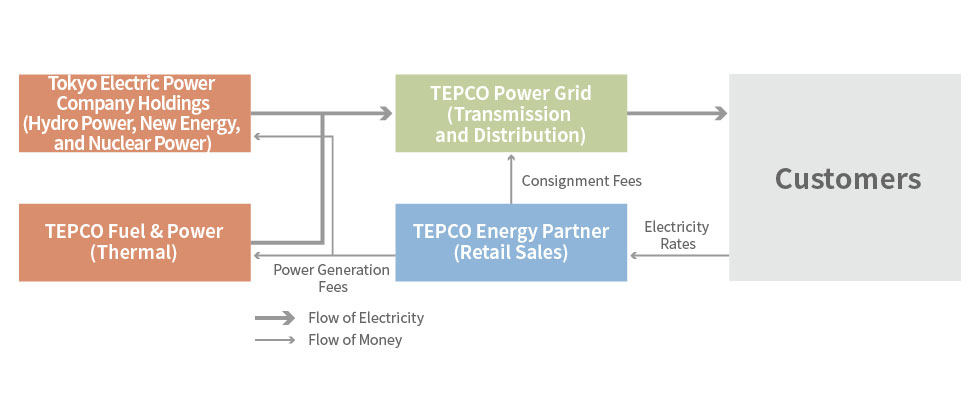Electric Power Business in Japan
Revising the Classification of Companies with the Liberalization of the Electric Power Market
In the past, Japanese electric power companies were classified as General Electric Utilities, Wholesale Electric Utilities, Independent Power Producers (IPP), Specified-Scale Electric Utilities, and Specified Electric Utilities. TEPCO had been classified as a General Electric Utility making it a full-service electric power company providing power generation, transmission, and distribution for general customers.
This type of business model was drastically revised with the full liberalization of the retail electricity industry in April 2016. This allowed any company to enter the retail electricity industry in any region and in response to any demand, eliminating the need for any concept of general or specified-scale demand. From April 2016, the necessary regulations have been implemented for the three business areas of "Power generation", "Power transmission/distribution", and "Retail electricity".
Although TEPCO has introduced a holding company system to create a main holding company and other business companies holding licenses to perform power generation, power transmission/distribution, and retail electricity sales, there are other companies that have not split into individual companies but rather simultaneously perform generation, transmission/distribution, and retail sales.
Among Specified-Scale Electric Utilities (New Electric Utilities), there are power companies owning power stations that perform power generation and retail sales of electricity.
Revising the Classification of Companies with the Liberalization of the Electric Power Market
- Provide for "General demand"
- Provision to the regulated sector such as households through provision operation, regional monopoly, and rate regulations.
(Fully distributed cost system: Approval system)
| Power Generation (Notification system) |
Power Transmission / Distribution (Approval system) |
Retail Electricity Sales (Registration system) |
|---|---|---|
| ○ | ○ | ○ |
Specified-Scale Electric Utilities (New Electric Utilities)
- Supply electricity for large-volume liberalized demand ("specified-scale demand")
| Power Generation (Notification system) |
Power Transmission / Distribution (Approval system) |
Retail Electricity Sales (Registration system) |
|---|---|---|
| ○ | ○ |
Wholesale Electric Power and Wholesale Electric Power Supply Companies
- Supply electricity to General and Specified-Scale Electric Power Utilities
| Power Generation (Notification system) |
Power Transmission / Distribution (Approval system) |
Retail Electricity Sales (Registration system) |
|---|---|---|
| ○ |
Flows of Electricity and Money
The revision of categorization of the industry has changed the structure of business operations that serve to deliver electricity.
Customers enter into a contract with a retail electricity sales company to purchase electricity. The retail electricity sales company purchases electricity from an electric power company and "retails" it to its customers. The electric power company creates electricity at its power generation facilities and is considered to be a "manufacturer" from the perspective of the retail electricity sales company. However, the electricity must be transmitted and distributed in order for it to reach the customers of the retail electricity sales company. Transmission/Distribution companies are responsible for "logistics", using their transmission and distribution facilities to deliver the electricity to the customers.
Retail electricity sales companies provide payment to power generation companies for power generation fees based on the electricity rates charged to customers and payment to transmission/distribution companies for electricity consignment fees.
An example of the TEPCO Group is shown in the figure below.

















